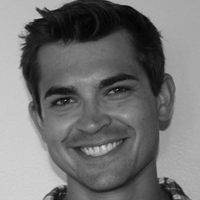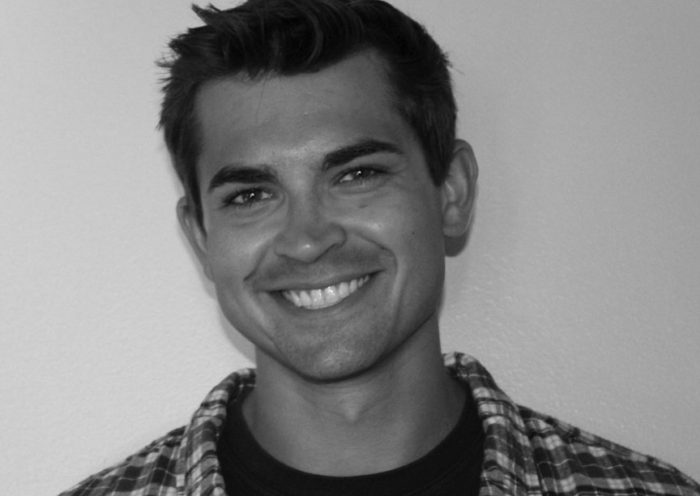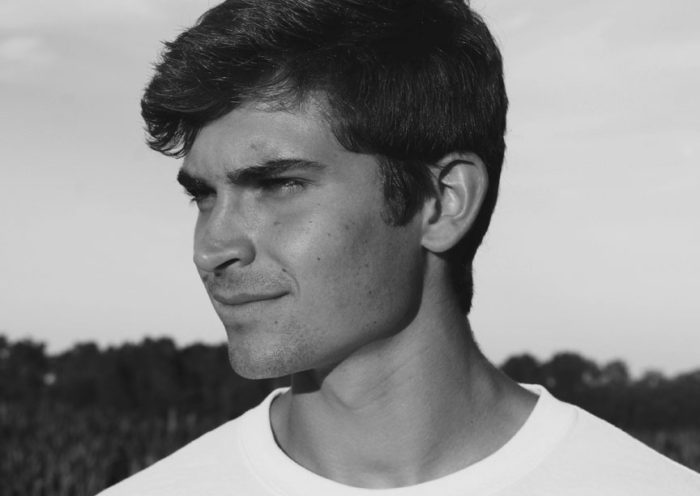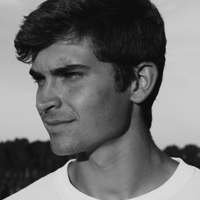Hit That Ridge Again But This Time Hit It Full Speed
By Riley Winchester
In the summer of 2003 I flipped a go-kart on its head in an attempt to impress my dad. I didn’t intend on flipping the go-kart, because my dad didn’t have some weird fascination with upside-down quadracycles, but in my attempt to impress him that’s ultimately what happened. What I was doing was following a simple order he had given.
Before the flip, I had been putzing around in the go-kart all afternoon with my younger sister Kylan in the passenger seat. We drove back and forth and around in laps in a brown barren field across the street from our house. I imagine we looked so tiny and slow in our cherry red 110cc go-kart, traversing the dry vast field like a Ford Focus driving through a Mad Max movie.
Across the street from us, my dad stood in our driveway and watched while he ate from a bag of cheddar cheese curds. At the time, I thought he was the biggest and toughest person in the world. He stood six-feet-tall; he wasn’t heavy but he was by no means thin—he had a small swell for a stomach, a flat chest, muscular biceps, and broomsticks for legs.
I grew bored of driving the same routes and Kylan was too scared to drive, so I turned the go-kart back toward my house and started home. I was ready to take a break from driving and do my usual summertime activities, like reading lowbrow juvenile literature or paralyzing my mind with Nickelodeon.
On the way back I hit a small bump in the ground that I hadn’t ever hit before. I was going slow enough that the go-kart only did an underwhelming little jump, bouncing maybe half an inch off the ground. I didn’t think much of it and kept driving toward my dad.
The closer I drove toward him, the more I noticed how excited my dad looked. His eyes had ballooned bright and his cheese curd chewing had been enlivened into cheese curd chomping. I stopped the go-kart about ten feet away from him and he ran up to the driver’s side and squatted down to talk to me.
“Did you feel that?” he said with a wide smile and raised eyebrows.
“Feel what?”
“That jump!”
“Uh,” I thought for a second, “yeah, I did.”
The smell of cheddar cheese emanated from his mouth and pervaded the air between us. My eyes squinted as I looked at him, attempting to block out the sun. Kylan sat silently in the passenger seat, not yet old enough or familiar enough with my dad to know what was about to come out of his mouth. But I knew, and I could already feel the nerves building up and the knot in my stomach cinch tighter and hotter.
Then he said it.
“Hit that ridge again but this time hit it full speed.”
———
Nobody asked for the go-kart but one day my dad came home with it and surprised us all—my mom, two sisters, and me. He had somehow jammed it into the bed of his pickup truck, and when he returned home he fashioned a homemade ramp to drive the go-kart down out of the bed. But since it was a kid’s go-kart, he couldn’t fit behind the wheel to drive it. So my first time behind the wheel of a go-kart I had to drive in reverse down a steep decline on thin planks of wood that had been rotting in the back of our barn for at least two full presidential terms.
I think it took me forty-five minutes to drive down the five-foot-long ramp because my foot was anchored on the brake and only let off it for millisecond-long intervals.
It was around the time of both mine and Kylan’s birthdays, so my dad justified the go-kart purchase by saying it was a shared birthday present for us. That summer I was hoping for either some new Yu-Gi-Oh! Cards or the latest releases in the Captain Underpants series—Captain Underpants and the Big, Bad Battle of the Bionic Booger Boy, Part 1: The Night of the Nasty Nostril Nuggets, and its sequel Captain Underpants and the Big, Bad Battle of the Bionic Booger Boy, Part 2: The Revenge of the Ridiculous Robo-Boogers. And I doubt Kylan had a go-kart on her birthday wish list. Nevertheless it’s what we were stuck with that year.
This wasn’t the first instance of my dad coming home with a new toy—as he called them—nor was it the last. At least a couple times a year he would come home with a quad or a UTV or a golf cart or some other small engine vehicle either packed into the bed of his truck or hauled in a trailer.
The funny thing was my dad always claimed the toys weren’t for him, even though we all knew they were. If he came home with a youth go-kart that he couldn’t fit in and drive, we knew his reason for buying it was so he would have something new to tinker on in the barn, a new engine to tear apart and figure out, a new project to consume his evenings and weekends.
My dad was a worker, blue-collar as they come, and he believed in the virtues of work, work, work, and then, when all the work is done, find some more work or make some more work. This was something I never understood. I didn’t like work, not one bit. It made me tired and sweaty, so why would I ever seek out more of it?
I thought my dad had some rare, still undiscovered mental illness—or at least some shades of masochism—because of his psychotic predilection for work. To me it was an unhealthy obsession with labor and an equally unhealthy aversion to leisure. We couldn’t have been more different in our philosophies.
My dad never sat still or slowed down. When I would help him finish a project in the barn, I thought I now had the freedom to sit and relax inside, read a book, study for tomorrow’s spelling test, level up my team in Pokémon Ruby on my Game Boy Advance. I would turn and start walking toward the house, then my fantasy would be interrupted by something like, “Grab me a 9/16 socket and a flashlight. And get under here and hold the light for me. It’s darker than rabbit shit—I can’t see a damn thing under here.”
His go-go lifestyle never allowed him to sleep in either, not so long as there was work to be done. And there was always work to be done. If I ever slept past 7:30 a.m. on weekends, my dad would Kramer-burst into my room, turn the light on, peel my eyelids open, and say, “Get up, don’t sleep your day away.” It was 7:30—the moon still hung hazily in the sky, the grass was blanketed with morning dew—and my day was already in danger of being slept away. When I would grumble and plead to sleep in for another hour, he would say, “Tough shit. When I was your age I was waking up at four in the morning to go milk cow tits.”
He wasn’t a man to ever slow down and stop and smell the roses, simply because he was too busy digging up an area for a new rose garden somewhere else. I didn’t understand. I liked slowing down and smelling all the pretty roses.
———
I swallowed down the gigantic nervous lump in my throat and said, “OK.” The word smacked of cowardice as soon as it left my mouth. I didn’t want to hit that ridge again, and I sure as hell didn’t want to hit it full speed. But I knew this was a rare opportunity for me, an opportunity to show my dad that I wasn’t weak or scared, and prove to myself that maybe we weren’t as different as I thought we were.
I turned the go-kart around and drove back toward the field, toward the ridge I was supposed to hit full speed, and away from the safety of my house. I sat at the end of the driveway, neurotically scanning back and forth across the street, checking for cars that I knew weren’t there. We were way out in the boondocks, no cars or any signs of civilization were within a country mile. And I knew that, but I needed to bide my time as long as I could before my imminent ridge-hitting death.
The go-kart trundled through the field. I stared at the ridge as I drove past it. I stared at it like an abandoned baby zebra stares at a clan of hyenas during a hungry summer in The Serengeti. Once I had driven what I thought was far enough past the ridge, I turned the go-kart around so I could hit the ridge while driving toward my dad. I figured if I was going to die trying to impress him, he ought to see it.
I looked at Kylan in the passenger seat—quiet, innocent, blissfully unaware—and wondered if I would be posthumously charged with murder after I inevitably killed us both.
The go-kart and I were still. My arms were rigid, hands glued to the wheel, right foot scared of the gas pedal. Sweat percolated through the papery hairs on the back of my neck. I licked my lips. They were dry, like the field I was about to barrel through at full speed against my will. The go-kart engine hummed, soft and unassuming. I took a couple deep breaths. I looked across the street toward my dad but all I saw was a fuzzy outline. The field ahead of me was speckled with heat mirages, looking like I was about to drive through a dozen little puddles.
Something possessed me—I don’t know if it was a murderous demon or a surge of dumb courage—and I hit the gas.
The engine screamed and I felt the stuffy air wash over my face as I charged toward the ridge. My foot pinned the gas pedal to the metal frame below it. It felt like I had broken the sound barrier in that brown barren field. I was going too fast and my mind was too scrambled to see where the ridge was. I started to panic, but my panicking was interrupted.
I hit the ridge.
And this time I hit it full speed.
The go-kart did a weak one hundred eighty degree flip, slammed back into the arid, compacted dirt, and kept moving forward on its head, sliding through the dirt and leaving a trail of red paint chips and indents in the earth.
When I finally came to, and when I finally found the courage to open my eyes, I looked straight ahead, out at the tree line off in the distance. It looked different now, like the trees were coming out of the sky instead of the earth. Kylan cried and screamed, castigating me for being stupid enough to flip the go-kart. Physically we were both unharmed—the roll cage, seatbelts, and helmets ensured that. But we were handling the mental trauma differently. Me, in shock and silence. Kylan, in tears and screaming.
I heard a familiar voice over Kylan’s screams.
“God damn! You really hit that, huh boy!”
My dad squatted down and looked at Kylan and me, still dangling upside down.
“I didn’t expect you to flip the damn thing,” he said.
He manhandled the go-kart back upright onto its four wheels and pulled Kylan out of the passenger seat.
“I’m gonna walk Ky back, OK?” he said. “You drive it back and pull it into the barn, bud.”
I tried to tell him I was too scared to drive it back but I couldn’t get the words out. It felt like concrete had been poured down my throat. It was then I realized I was nothing like my dad. He could flip a go-kart and get right back on it. I didn’t want to flip go-karts, let alone even drive go-karts. I wanted comfort and stillness and safety. I wanted to be anywhere but behind the wheel of that stupid go-kart in that stupid field.
———
Years went by and things remained the same. My dad continued his busy lifestyle, and I continued to do, and be, the opposite of him. He spent his time playing around with motors and listening to classic rock on the old radio in the barn. I spent my time playing online video games and listening to prepubescent boys call me slurs and say how they all had defiled my mom.
Then in November of 2013 my dad was diagnosed with stage IV colorectal cancer.
Life hadn’t just thrown a couple speed bumps his way, it had laid out miles of spike strips ahead of him.
Still, he continued, to the best of his ability, to live the same life as he had before. He underwent a total colectomy in March of 2014, and his colon and the cancer were removed. He was fitted with a colostomy bag, which was now, without a colon, his only method of releasing excrement. He joked that he now saved so much time without having to stop what he was doing to use the bathroom, and he could be even more productive than before. Life, he thought, had regained a sense of normalcy.
But the normalcy was short-lived.
Seven months after the total colectomy, the cancer came back, and this time it refused to be defeated. The cancer perniciously took hold of his body and destroyed it from the inside out. It spread to his lymph nodes, his peritoneum, his lungs, tumors invaded his back and lumped along the crease of his spine.
By December of 2015, the cancer had completely seized his body and there was no hope of recovery, not even a miracle could save him. There is nothing else in this world that weakens and destroys someone like cancer, not even the most destructive war or brutal fight. Nothing else can strip someone of their essence, of their self—these always remain, even after the worst defeat. But cancer will. It will take these elements of someone’s being and shatter and trample them into the dust for everyone to see.
My dad was admitted into hospice care where he was put into a medically induced coma. His body was plastered with Fentanyl patches, his veins ran heavy with Dilaudid and Oxycodone and Alprazolam and Methylphenidate and other pharmaceuticals to alleviate his physical pain and shut off his mind.
I spent five days in a sofa chair by his bedside. I had never seen him sit so still, never in the eighteen years I had spent with him. He had never looked so small. His body had shriveled; bones now outlined the parts of his arms that were before inhabited by muscle. His face was sallow and pruned to the jagged corners of his jawline. The biggest and toughest person in the world had been beaten, abused, and destroyed into a frail little fragment of what he once was. For the first time in my life I was bigger than him, and I hated it.
The man I saw in the bed, I thought, wasn’t the same man I had known, the man who raised me. The man who was always on the move, never living a passive life, the man who told me to hit that ridge again but this time hit it full speed—because he wanted me to live fast and take chances like he did—was no longer there.
He died Sunday, December 6, 2015, at 2:25 p.m.
Sometimes I wonder if it wasn’t the metastatic cancer that killed my dad but the stillness. For five days he lay in that hospice bed, motionless, unable to get up and move and live how he always had. I imagine the back of his mind was filled with little anxieties the entire time he was in hospice—the oil change my car needed, the water softener that needed to be refilled with salt, the shaky stair banister that he planned on replacing. It must have driven him crazy.
After he died, my mom, sisters, and I individually spent some time in the hospice room with my dad. Although his body had been essentially dead since he arrived at hospice, and I had spent five days with him like that, it was strange to see him now eternally still. I sat in the sofa chair by his bedside and stared at him. I wanted to say something but I couldn’t. There wasn’t anything blocking my ability to speak—my throat was clear and my voice box was smooth and ready. I didn’t say anything because I thought nothing needed to be said between us. Everything that needed to be said had already been said, and it was now the time for silence.
As I stared at my dad longer, I created this image in my head of him opening his eyes, turning toward me, smiling, and saying, “Get up, we gotta go home and snow blow the driveway!” Or, “Come on, we gotta run to the hardware store right quick!”
Part of me thought it would actually happen. I convinced myself enough of it that I inched my right index finger toward my dad and poked him on the shoulder to check if he was actually dead or just faking it.
He wasn’t faking it.
I laughed when I thought of how ridiculous I must have looked, how ridiculous I was for even having a thought like that. I like to think my dad, wherever he was, laughed too.
———
Had my dad been born in the Neolithic Period, he would have taken the newly developed scrapers, blades, and axes and cultivated a thousand acres of land overnight by himself.
Had my dad been born in Antiquity, he would have given Plato a wet willie and said, “Shut up with all that science talk and gimme that hammer over there.”
Had my dad been born in the Age of Discovery, he would have circumnavigated the world three times over before Magellan had even left port.
Instead, he was born on a summery day in April in 1966, and he was my dad.
At times I thought the only thing we had in common, and the only modicum of proof that I was his son, was how much we looked alike—we’re basically twins born thirty-one years apart. We thought differently, we acted differently, we lived differently. He liked to work; I liked to think. He was fearless and outgoing; I was demure and reserved. He lived fast and didn’t think about consequences; I preferred to take things slow.
My dad once said that people have a lot more in common than they realize, but it’s just that differences stick out a lot more and that’s what we notice. I had never given that much thought until after he died—I had always discredited it as another one of his hackneyed little aphorisms he liked to throw around sometimes to seem intellectual. The differences between my dad and me stood out much more when he was alive. But now with time apart—physically and emotionally—I’ve become privy to all that we shared in common.
We had the same sense of humor and laughed at the same jokes—whenever he heard a new joke somewhere, he couldn’t wait to share it with me. We never took ourselves too seriously, no matter how serious of a situation we were in. We both liked mindless action movies with no plots. We both liked Detroit sports, and we even went to some Tigers, Lions, and Pistons games together. We both liked to eat our French toast smothered in ketchup.
They’re little things, but they’re little things that mean a lot to me.
And I know they meant a lot to him.
The day I flipped a go-kart on its head I thought I would never in a million lifetimes understand my dad. I thought I could never understand someone so different than me, someone maniacal enough to convince a six-year-old kid to attempt suicide by go-kart. It was a confluence of confusion and terror. I wasn’t even sure if my dad was human. But, as it turned out, I just didn’t yet understand the simplicity of his life philosophy.
My dad wasn’t content with putzing around in a go-kart in the brown barren field across the street. That wasn’t enough for him. He believed that, sometimes, you just gotta hit that ridge again but this time hit it full speed.
BIO

Riley Winchester’s writing has appeared or is forthcoming in Ligeia Magazine, Miracle Monocle, Sheepshead Review, Ellipsis Zine, Beyond Words, Pure Slush’s “Growing Up” Anthology, and other publications. He lives in Grand Rapids, Michigan.
















